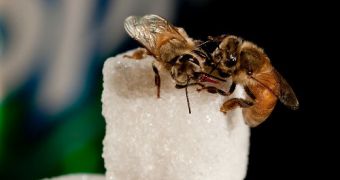Investigators from the Arizona State University (ASU) have determined that studying honeybees may provide new data on the connections that exist between taste perception and the development of metabolic disorders. Millions of people are currently affected by such conditions.
Scientists from the ASU College of Liberal Arts and Sciences are conducting genetic experiments on these bees because some of their physiological and genetic traits are similar to our own. They are especially well suited for studying sugar sensitivity, diabetes and the carbohydrate metabolism.
Apparently, all of these aspects are inter-connected, and all of them are connected to the sense of taste. Details of the new investigation appear in the latest issue of the open-access scientific journal PLoS Genetics, which is edited by the Public Library of Science.
The work was led by ASU CLAS School of Life Sciences research scientist Ying Wang and associate professor Gro Amdam. The team was able to stop the activity of two genes that are essential for the operation of master regulator modules (MRM) in bees.
These MRM control behaviors related to food acquisition, ingestion and processing. The team then discovered a link between sweet taste perception and the state of internal energy, a molecular pathway that they had no idea existed.
“A bee’s sensitivity to sugar reveals her attitude towards food, how old the bee is when she starts searching for nectar and pollen, and which kind of food she prefers to collect,” explains Wang.
“By suppressing these two ‘master’ genes, we discovered that bees can become more sensitive to sweet taste. But interestingly, those bees also had very high blood sugar levels, and low levels of insulin, much like people who have Type 1 diabetes,” adds the expert, also the lead author of the paper.
“Now, if one can use the bees to understand how taste perception and metabolic syndromes are connected, it’s a very useful tool,” adds Amdam. The expert, based at the Norwegian University of Life Sciences, has a laboratory dedicated to studying bees.
“Most of what we know about deficits in human perceptions is from people who are very sick or have had a brain trauma. We know shockingly little about people in this area,” he concludes.

 14 DAY TRIAL //
14 DAY TRIAL //